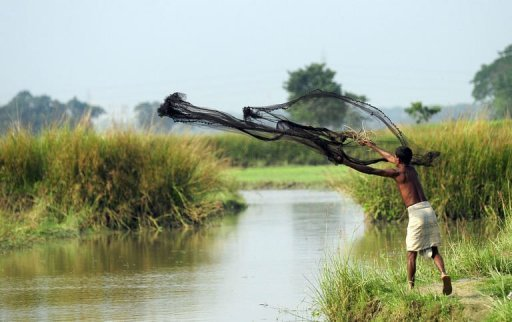Bangladesh’s once plentiful rivers run low on fish – At least 25 freshwater species now extinct
By Kamrul Hasan Khan (AFP)
24 December 2010 CHAR PALIAMARY, Bangladesh — Bangladesh’s rivers have provided for fisherman Rafiqul Islam’s family for generations but a few years ago the 27-year-old noticed his nets were coming up empty. This year, Islam was forced to leave his small fishing community in northern Mymensingh district to find work, an early victim of what scientists are warning is an alarming decline in freshwater fish stocks. “Eight, ten years ago it was possible for a fisherman to make a decent living all year round — now, our catches are tiny and most people are having to find other seasonal work to survive,” Islam told AFP. Surveys of fish stocks paint a gloomy picture. According to a report by the International Union for Conservation of Nature (IUCN) in 2000, Bangladesh is home to 266 species of freshwater fish, 54 of which are classified as “threatened” in the group’s Red List. But a more recent study by the Bangladesh Agricultural University (BAU) stated that at least 25 of the freshwater species of fish are now extinct and over 100 species should be classed as threatened. “We are losing our freshwater fish at an alarming rate,” said Professor Mostafa Ali Reza Hossain of the BAU, whose team has spent a decade travelling the country to track the decline in fish species. The dwindling of freshwater fish has major repercussions for low-lying and deeply impoverished Bangladesh, home to numerous rivers, floodplains, lakes and lowland areas. It puts over a million jobs at risk, will accelerate migration of the estimated 1.4 million fishermen to Bangladesh’s already overcrowded cities, and removes a crucial, free source of protein for the rural poor. It also risks having a catastrophic effect on overall biodiversity as the impact ripples up the food chain to birds and reptiles, Hossein said. … Overfishing, especially using illegal drag nets, industrial pollution of fish breeding grounds and the impact of pesticide run-off from farms are the primary reasons behind the decline, the BAU’s research has found. In addition, waterways are being filled up for construction of roads, bridges and houses to accommodate Bangladesh’s ever-increasing population, which grew nearly two-and-a-half times in four decades. …
